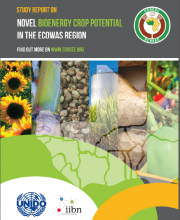GENERAL INTRODUCTION TO THE PROJECT
ECREEE launched the project "Regional potential assessment of novel bioenergy crops in fifteen ECOWAS countries" in 2012, in partnership with UNIDO, IIBN and QUINVITA, based on the need to make an overall assessment of a series of novel potential bioenergy crops that can or could be grown and processed in the ECOWAS member states. The project fits in a broader strategic analysis of alternative energy needs and production, the key mandate of ECREEE. The project partners deliberately excluded conventional "bio energy" crops such as sugarcane, oil palm, maize or sunflower as target crops, since a sufficient knowledge base on the growing and processing of these crops is available globally. The selection of these crops is such that either the agricultural knowledge is still limited and/or the use of the crop as an energy source is relatively new. Its was then realized that the list of selected crops are few, and that other novel crops may have a potential in the region. The project methodology is such that it can be replicated in the future for analyzing the potential of other crops.
The crops that were selected for this study includes: False Flax (Camelina sativa), Crambe (Crambe abyssinica), Cassava (Manihot esculenta), Castor bean (Ricinus communis), Cashew (Anacardium occidentale), Groundnut (Arachis hypogaea), Jatropha curcas and sweet sorghum (sweet version of Sorghum bicolor).
The project was structued in two phases - In the first phase, 8 different crops were analyzed for adaptation to the growing conditions and agricultural systems in the region and also consider the broad operating context for the establishment of novel bioenergy crops in these countries. Based on this analysis 4 crop/region combinations have been selected for an in depth feasibility study in the second phase of the project.
Ricinus communis produces alternative industrial oil with very interesting attributes but which is too valuable and also technically not optimal to be used as a bio-energy crop. Arachis hypogaea was not retained for further analysis because the project team believes that this crop first needs to be fully exploited as a food crop in the region. More information is available in the report.


